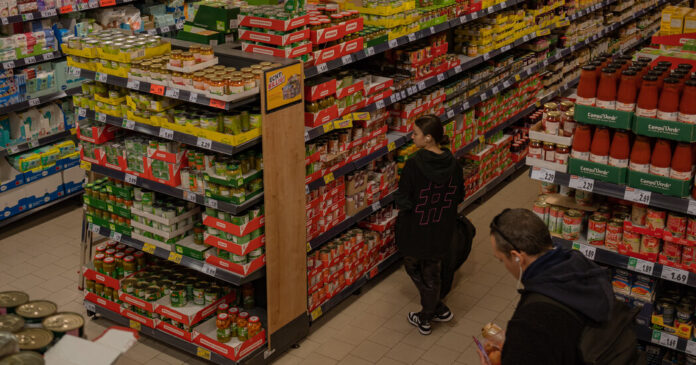Why It Matters: The goal is to control inflation while preventing a recession.
The International Monetary Fund recently said that taming inflation while avoiding a recession was Europe’s biggest challenge in the months to come, as the continent continues to digest the impact of the war in Ukraine on its economy.
So far, the European Central Bank’s campaign to raise interest rates has helped drive overall inflation down from a peak of 10.6 percent last October. The eurozone has avoided a recession, but economic growth remains modest.
Data on lending released on Tuesday by the central bank showed that demand for consumer credit was weakening, as banks made it more difficult for borrowers to receive credit and high interest rates for borrowing caused demand to fall, further cooling the economy.
But policymakers warn they are looking for indications that prices will be coming down over the long term.
“We must see a sustained decline in core inflation that gives us confidence that our policies are starting to work,” Isabel Schnabel, a member of the central bank’s executive board, said in an interview with Politico last week.
Country by Country: Rates remained high in the Baltics, but dropped in Germany.
Baltic countries and Slovakia had double-digit price increases, as high as 15 percent for Latvia. Some of the larger European economies with lower rates are dealing with pressure from workers seeking wage increases to keep up with the increased cost of living.
The diverging rates also reflect domestic measures that governments have introduced to rein in energy prices. As the summer vacation season picks up, countries with strong tourism markets are also poised to see the impact of rising service prices.
In Germany, Europe’s largest economy, the annual rate of inflation eased to 7.6 percent from 7.8 percent in March. Food prices remained stubbornly high, while government intervention to tame energy costs began to take hold.
Workers in Germany’s public sector secured a deal to give 2.5 million employees a 5.5 percent pay increase next year. That pact is expected to set a precedent for other pay talks and could threaten the European Central Bank’s forecast that eurozone wage growth will peak this year.
In France, which has been plagued for months by waves of strikes over the government’s decision to raise the retirement age, inflation rose to 6.9 percent in April, from 6.7 percent in March, driven largely by energy, with the price of services also climbing a little.
In Spain, prices climbed to 3.8 percent in April, from 3.1 percent the previous month as food costs climbed, even as energy prices that had soared to record levels last year continued to drop.
What’s Next: A decision by the European Central Bank.
The inflation data will influence the European Central Bank’s decision on whether to continue raising interest rates in an effort to bring down inflation. The bank’s Governing Council meets on Thursday, and most analysts are estimating it will vote to increase rates by either a quarter or a half percent.
The bank raised its deposit rate to 3 percent last month, the highest since October 2008, as it has sought to cool demand and bring inflation closer into line with its target of 2 percent.
“Even if headline inflation has come down and will come down further, this is not yet the moment of relief,” Carsten Brzeski, a chief economist at ING Germany, said. “The E.C.B. doesn’t want to repeat the previous mistake of underestimating inflation and will therefore be willing to go too far, even if this eventually turns out to be a policy mistake.”


